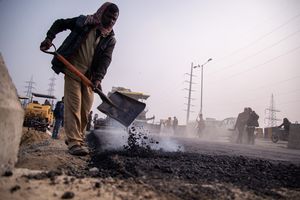One of the peculiar frustrations of being an elected representative in India is the widespread ignorance among the electorate of the responsibilities and authority of those they are electing to office. We have three tiers of governance—local, state and federal—to which the same voters elect, at different times, councillors, MLAs and MPs. Yet an overwhelming majority of our citizens have no clue what role they are electing each of these representatives for.
On a recent “thank-you” tour of my constituency, which had just returned me to Parliament for a fourth time, I found myself greeting, from atop my open jeep, voters who in the same breath were pointing to the rutted, potholed stretch of road I was travelling on, making it clear they expected me to repair it now that I had won. But in every case the road was the responsibility of either the city council or the village panchayat and not the MP. Local roads are maintained by local government bodies; state roads by the state government, to which the MLA is accredited and where he or she has some influence; and central roads are those for which the MP can be made accountable. These are the National Highways and those major roads financed by the Union government under the Central Road Fund or the Pradhan Mantri Gram Sadak Yojana—not narrow country roads, vital though these are to those who live near them. But try explaining this to a voter, who assumes that MLAs exist to do what councillors can’t, and MPs to do what MLAs can’t! The confusion is compounded by the expectation that each elected representative must deliver “development” to his constituency.
Just as MLAs have some budgetary allotments available to them—in Kerala, each MLA receives Rs6 crore to be spent on development projects of his or her choice—MPs have the Members of Parliament Local Area Development Scheme funds, which entitles them to spend Rs5 crore a year on projects in their constituencies. But a Lok Sabha MP in Kerala represents seven MLA constituencies, and 25 per cent of the MPLADS total is reserved for expenditure on projects benefitting SC/ST communities, which leaves each MP some Rs50 lakh for each constituency where an MLA is spending Rs6 crore, 12 times as much. Inevitably the scale of the MP’s “development” projects is dwarfed by comparison with the MLA’s, yet voters cannot understand why the “more important” MP cannot do more.
MPs must lobby the Central government, but cannot determine favourable outcomes, and many require state government decisions, too. The question of an All India Institute of Medical Sciences for Kerala is a case in point. I stated during the election campaign that no MP can promise (as my opponent was doing) to set up an AIIMS in a location of his choice—it depends on what the state government proposes. When my party was in power in the state, I had ensured that Thiruvananthapuram was added to the list of possible AIIMS locations submitted by the state government to the Centre—and lobbied the Central government to choose it. But when the left came to power in Kerala, it opted for Kozhikode as the sole choice before the Centre. No MP could have done anything about that—it is, after all, the prerogative of the state to identify the location and provide the land.
But if voters do not always understand the complementary roles of the state and the Centre in decisions affecting their lives, they do not understand the differences either. During the recent election in my constituency, I was amused and mortified to see a viral video put out by the BJP campaign that showed a middle-aged woman voter saying she had voted communist all her life, but was now going to vote for the BJP because the communist government had not paid her pension for the last seven months. The poor lady had no idea that electing a BJP MP would make not a whit of difference to her pension, which is paid by the state government—where the left is in power and the BJP has no role.
Democracy is India’s greatest asset—but that doesn’t mean all Indians understand how our democracy works!
editor@theweek.in


